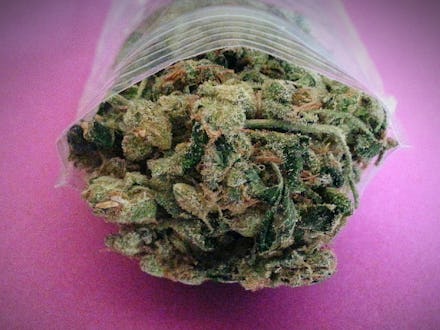What it's like to be allergic to weed

As an already high-strung person living through a flaming trash heap of a year, I welcome the giddiness and chill that ripple over me when I occasionally light up a joint or take an edible. Sadly, I’ve been sans weed for the past few weeks, since my partner and I drove cross-country for the summer and didn’t want to risk getting caught crossing state lines with a stash in our van. At least the absence is temporary. Thank God I’m not allergic to weed, I thought a few days ago. That would be terrible. Wait — can you be allergic to weed? A Google search revealed that, yes, you absolutely can. I asked one of my favorite weed experts to walk me through this unfortunate phenomenon.
“You can be allergic to anything,” including cannabis, Lewis Nelson, chair of the department of emergency medicine and chief of the division of medical toxicology at Rutgers New Jersey Medical School, tells me. And as more of us consume the substance, especially amid the rise of legalization, we can probably expect more reports of cannabis allergy, according to the American Academy of Allergy, Asthma & Immunology.
An allergy is an immune reaction to a foreign substance that usually doesn’t trigger such a reaction. Upon their first exposure to cannabis, people who are allergic to it make antibodies in response to a part of the plant — typically pollen or some other protein, not chemicals like THC (short for tetrahydrocannabinol, which gets you high), Nelson says. The next time they use weed, the antibodies attack the protein, which manifests as an allergic reaction, with symptoms ranging from a stuffy nose and a rash, all the way to wheezing, vomiting, diarrhea, and anaphylactic shock.
In most people who have cannabis allergy, smoking and/or ingesting weed can trigger a reaction Rarely does merely touching it do so, although it’s possible if you’re extremely hypersensitive to the allergen responsible, Nelson says. (The odds of an allergic reaction are greater if you touch the plant, then touch the inside of your nose, ear, or other mucus membrane, where it can get absorbed into your body.) Smelling weed doesn’t typically result in a reaction, either, since the terpenes and other tiny chemicals that underlie its odor tend not to be allergenic, although they can be. Again, people who have cannabis allergy more often react to proteins in the plant.
Although vomiting is a less-common symptom of cannabis allergy, cannabinoid hyperemesis syndrome — CHS, or intense, non-stop puking and nausea, associated with daily, prolonged weed use — isn’t allergy-related, Nelson says. Instead, CHS may have more to do with alterations in the cell receptors involved in nausea, Eddy Lang, a physician and professor of emergency medicine at the University of Calgary, told me for a story I previously wrote for Mic.
You might be at higher risk for a cannabis allergy if you already have a lot of other allergies, Nelson says. “There are definitely people who are predisposed to having allergic reactions.” Although allergenic proteins in foods like peaches and tomatoes might look like the allergenic proteins in cannabis — implying that allergies to such foods might make you more susceptible to cannabis allergy — Nelson hesitates to draw such a correlation.
If you experience what seems like even mild allergy symptoms when you imbibe, put down the weed and call your doctor, Nelson says. “You never know if the next allergic reaction is going to be a big one.” In what’s known as a prick skin test, an allergist can scratch your skin with a tiny needle, which will break the top surface and expose the underlying layer to the plant, Nelson says. The plant will likely be in the form of a slurry or extract, per the AAAAI.
In other words, a weed allergy can be not only a bummer, but if you’re extremely hypersensitive to it, dangerous and even fatal. As much as the wellness world touts the benefits of the plant, it’s important to remember that it’s not totally benign, and could in fact have gnarly side effects.